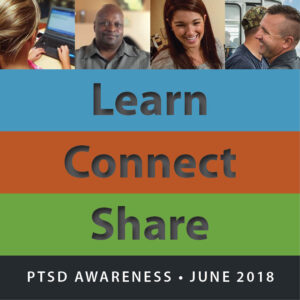June is PTSD Awareness Month; we can all help those affected by post-traumatic stress disorder. PTSD is a severe iteration of mental illness that requires treatment and daily maintenance; those who recover rely on a combination of trauma-focused psychotherapy, counseling, and non-narcotic medications. Unfortunately, the overwhelming majority of individuals living with the affliction never receive the kind of care they require; such persons are apt to turn to drugs and alcohol to cope which only serves to make the underlying condition more serious.
Those of you in recovery from alcoholism and substance use disorder are no strangers to trauma; after all, people’s active addiction often involves one uncomfortable experience after another. In some cases, traumatic experiences precipitate the use of mind-altering substances; in other scenarios, people’s substance use puts them into situations where experiencing trauma is almost a foregone conclusion. Human beings are capable of putting themselves at great peril due to mental illness; as a result, one both inflicts wrongs upon others or are their self the victim of another person’s’ wrongdoing; in either case, being OK in one’s skin and sleeping at night is not an easy endeavor.
The painful incidents that occur during active addiction often lead to a vicious cycle; using leads to trauma and one of the reasons people continue to use is to quiet the internal echoes of one’s past discomforting episodes, and at a certain point, one loses sight of where the trauma ends, and they begin.
Trauma is a time traveller, an ouroboros that reaches back and devours everything that came before.” —Junot Díaz
Signs and Symptoms of PTSD
Not surprisingly, PTSD is one of the more common co-occurring mental health disorders accompanying alcohol and substance use disorder. While treatment is effective and long-term recovery is possible, people living with the afflictions like PTSD often struggle accessing assistance. Encouraging people to seek help is of the utmost importance, and society benefits when those struggling receive aid.
In order for individuals to get treatment we first need to discuss what the condition looks like; the signs manifest differently in each person, but the National Center for PTSD lists four symptoms:
- Reliving the event (also called re-experiencing symptoms). You may have bad memories or nightmares. You even may feel like you’re going through the event again. This is called a flashback.
- Avoiding situations that remind you of the event. You may try to avoid situations or people that trigger memories of the traumatic event. You may even avoid talking or thinking about the event.
- Having more negative beliefs and feelings. The way you think about yourself and others may change because of the trauma. You may feel guilt or shame. Or, you may not be interested in activities you used to enjoy. You may feel that the world is dangerous and you can’t trust anyone. You might be numb, or find it hard to feel happy.
- Feeling keyed up (also called hyperarousal). You may be jittery, or always alert and on the lookout for danger. Or, you may have trouble concentrating or sleeping. You might suddenly get angry or irritable, startle easily, or act in unhealthy ways (like smoking, using drugs and alcohol, or driving recklessly.
PTSD, Self-Harm, and Suicide
Most people associate post-traumatic stress with combat; those returning from conflicts overseas often experience lingering effects from exposure to trauma. However, PTSD doesn’t just affect veterans, a noteworthy percentage of general public struggles with the condition, as well; in fact:
- About 7 or 8 out of every 100 people (or 7-8% of the population) will have PTSD at some point in their lives.
- About 8 million adults have PTSD during a given year. This is only a small portion of those who have gone through a trauma.
- About 10 of every 100 women (or 10%) develop PTSD sometime in their lives compared with about 4 of every 100 men (or 4%).
In the absence of treatment, people rely on using drugs and alcohol to cope with their feelings of hopelessness, shame, and despair. While mind-altering substances may quiet one’s anxiety and depression, alcohol and substance use tend only to exacerbate the underlying condition. It’s worth mentioning again that self-medicating mental illness is a vicious cycle; the behavior is a sure path to addiction, self-defeating behaviors, and self-harm. There is a robust association between PTSD and suicidal ideation or attempts. If you or a loved one is contending with thoughts of self-harm, please call the National Suicide Prevention Lifeline: 1-800-273-TALK (1-800-273-8255).
Encouraging PTSD Treatment
Greater understanding and awareness of PTSD will help Veterans and others recognize symptoms, and seek and obtain needed care.” – Dr. Paula P. Schnurr, Executive Director of the National Center for PTSD
During June, the National Center for PTSD asks that everyone take some time to Learn about PTSD and the valid forms of available treatments; Connect with support services for yourself or a loved one—reach out for help; and Share what you learn about PSTD with the world via social media. When we work together to take the mystery out of mental illness, we can encourage more people to seek help.
At PACE Recovery Center, we can help you or a loved one learn how to navigate life without resorting to drug and alcohol to cope with symptoms of post-traumatic stress disorder. Our highly qualified team of addiction professionals can address your co-occurring mental health disorders and teach you effective coping skills. Please contact us today to learn more about our programs.



